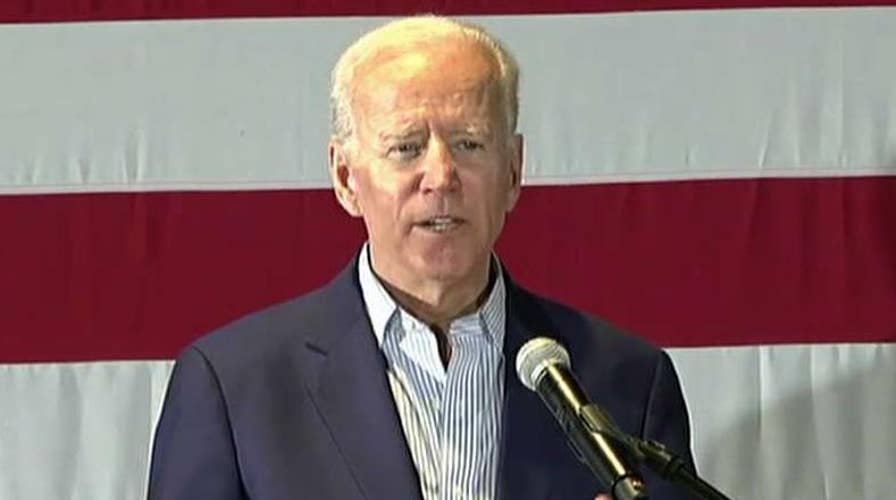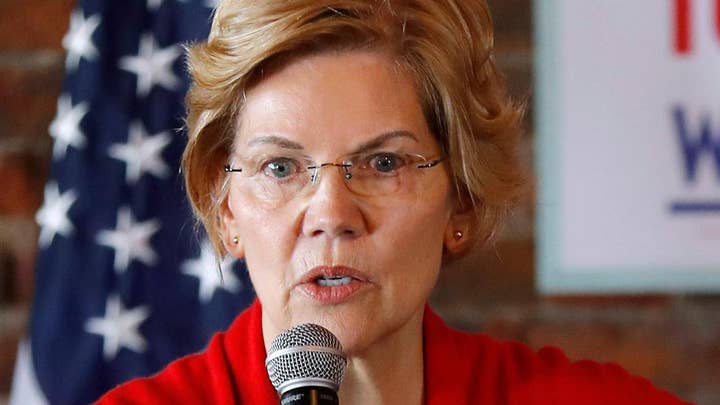Joe Biden campaigns in Iowa, hammers President Trump
Former Vice President Joe Biden says America can't afford four more years of the Trump administration; Mike Tobin reports from Cedar Rapids.
It was a telling moment for newly declared Democratic presidential candidate Joe Biden.
Speaking with reporters on the campaign trail in Monticello, Iowa, the former vice president was asked Tuesday about some jabs from Sen. Bernie Sanders of Vermont, a top rival for the Democratic nomination.
Biden – the front-runner for the 2020 nomination race in just about every national and early-voting state poll – didn’t engage.
“We got plenty of time to respond, I’m not going to get in a debate with my colleagues here,” Biden said.
Rather than respond to attacks from his numerous primary rivals, Biden right now is running a general election-style campaign, keeping his focus almost entirely on Republican President Trump.
Presumably, this is by design.
“I think his strategy makes sense right now. And it’s a strategy I’m not sure very many other people could pull off because he’s so well known by the electorate,” explained Mo Elleithee, the founding executive director of the Georgetown Institute of Politics and Public Service and a Fox News contributor.
BIDEN TOPS SANDERS, O'ROURKE FOR LARGEST FIRST 24 HOUR FUNDRAISING HAUL
Elleithee, a senior spokesman for Hillary Clinton’s 2008 presidential campaign who later served as communications director for the Democratic National Committee, emphasized that Biden “doesn’t need to spend the same amount of time as some of the other candidates do in introducing himself. He can go straight to drawing the contrast between two very different visions of America.”
That’s what the former vice president is doing, as he essentially ignores at this point the other candidates in an extremely large Democratic field that’s reached 20 contenders.
In his video last week launching his White House bid, Biden pointed to the violent clashes in Charlottesville, Virginia in August of 2017 at a white nationalist rally and took aim at the president’s response at the time that there were “people that were very fine people on both sides."
BIDEN SNAGS FIRST MAJOR UNION ENDORSEMENT IN 2020 RACE
The former vice president charged in his video that “with those words, the president of the United States assigned a moral equivalence between those spreading hate and those with the courage to stand against it."
Biden spotlighted Charlottesville again on Monday in Pittsburgh, as he hit the campaign trail for the first time as a 2020 presidential contender. And Tuesday, speaking to a crowd in Cedar Rapids, Biden warned of the dangers of re-electing Trump.
“You all know in your gut that this election for president is different,” Biden stressed. “Limited to four years, this administration will go down as an aberrant moment in time. But give eight years to this administration and the White House and we’re going to forever and fundamentally change the character of the country.”
Trump has been drawn into the fray as well, firing back at Biden on Twitter and blasting a major firefighters union for endorsing him.
Elleithee explained that it benefits Biden “to be able to jump ahead – at least at this stage – and show that he can make a compelling case to the country on why his vision is better than the president’s.”
He added, “While much of his message is focused on Trump, what it’s doing is drawing a contrast between Trump’s angry vision versus his hopeful vision, appealing to our better angles.”
“It’s no mistake that of the three pillars of his campaign, Biden led with ‘the battle for the soul of this nation,’” Elleithee noted. “It’s a double message – one for a general election electorate but very much for a Democratic electorate as well.”
Hours after he launched his campaign, Biden immediately took incoming fire from both Sanders and Sen. Elizabeth Warren of Massachusetts, another populist Democratic contender promoting progressive proposals.
Warren contrasted her longtime record of taking on Wall Street with that of Biden, reigniting a nearly two-decades-old fight between the two over the country’s bankruptcy laws.
“At a time when the biggest financial institutions in this country were trying to put the squeeze on millions of hard-working families who were in bankruptcy because of medical problems, job losses, divorce and death in the family, there was nobody to stand up for them,” Warren said while campaigning in Iowa.
“I got in that fight because they just didn't have anyone," she said. "And Joe Biden was on the side of the credit card companies.”
That night -- as the former vice president spent his first evening as a 2020 candidate raising campaign cash at the suburban Philadelphia home of David Cohen, a senior executive of the Comcast Corp. and a former Democratic operative -- the Sanders’ campaign criticized Biden.
In a fundraising email to supporters, Sanders’ campaign manager Faiz Shakir wrote that “it's a big day in the Democratic primary and we're hoping to end it strong. Not with a fundraiser in the home of a corporate lobbyist, but with an overwhelming number of individual donations in response to today's news.”
Neither Biden nor his campaign reacted to either of the jabs.
Sanders – Biden’s main rival at this early stage in the election cycle – on Monday contrasted his record with the former vice president's.
"I helped lead the fight against [the North American Free Trade Agreement]. He voted for NAFTA," Sanders said during an interview on CNN. "I helped lead the fight against [permanent normal trade relations] with China. He voted for it. I strongly opposed the Trans-Pacific Partnership. He supported it. I voted against the war in Iraq. He voted for it."
Asked about those comments, Biden didn’t respond to Sanders’ criticism. But he did defend his NAFTA vote in the Senate a quarter century ago, saying “it wasn’t” a mistake.
Biden added that he wasn’t alarmed about running against a 20-person field. And he said that he would engage his rivals for the nomination when the primary debates get underway at the end of June.
The snipes by Sanders and Warren offer a preview of attacks likely to come during those monthly debates. Sanders and Warren – and others in the field – represent the progressive wing of a party that’s moved to the left in recent years. Biden, who calls himself an ‘Obama-Biden Democrat,’ is viewed as the more moderate, party establishment candidate.
Despite their obvious differences, both Biden and Sanders are battling for many of the same people – the working-class voters in the Rust Belt states that abandoned the Democrats in 2016 and helped put Trump in the White House.
Elleithee said that Biden doesn’t need to engage with his primary rivals right now.
“There’s a time during the debates when he’ll be able to respond to the jabs coming at him,” he noted.
“Right now he’s still laying out the rationale for his case and it’s pretty clear that he wants to [go] bigger than focusing on the direction of the party, he wants to focus on the direction of the country.”
















































